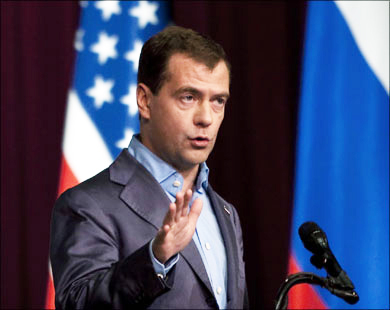Azerbaijan, Baku, September 25 / Trend T. Jafarov /
The Iranian and Russian experts have different opinions on Russian President Dmitry Medvedev's decree to ban supplies of Russian arms to Iran.
The Iranian expert thinks that this decree is not profitable for Russia. The Russian expert is convinced that Moscow would compensate for possible losses in other areas.
"Medvedev must know that his policy and his decisions give benefit neither him nor Russia," Iranian deputy chairman of the parliamentary committee on national security and foreign policy Ismail Kovsari said over phone from Tehran.
The Russian Institute for Middle Eastern Studies president Yevgeny Satanovsky said that the decree opens tremendous prospects on the Arab arms market, covering the losses from the failure of the contract with Iran.
Russian President Dmitry Medvedev signed three decrees to ban the supply of S-300 missile defense systems, military aircrafts, combat ships and armored vehicles to Iran, the entry of certain people engaged in Iran's nuclear program. One of decrees established a limit for insurance companies cooperating with the country.
Earlier, Russia voted for the adoption of the resolution 1929 of the UN Security Council against Iran's nuclear program. Afterwards, these decrees appeared.
Russian Deputy Foreign Minister Sergei Ryabkov, on a visit to New York to attend the UN General Assembly, said in his interview with media that Medvedev's decree does not mean the end of military cooperation between Russia and Iran.
Moscow thinks that it has set all the limits prescribed by the UN Security Council resolution 1929. But it is not interested in committing any further actions beyond the resolution.
Russia condemns the use of additional sanctions by U.S. and Europe against Iran, which were unforeseen by the UN Security Council.
Kovsari said that Medvedev signed the decree under pressure from the Zionists and the hegemonic countries.
"Medvedev signed the decree under pressure from the Zionists and the hegemonic countries. Medvedev must reconsider the decision and comply with the requirements of the agreements signed between the two countries," Kovsari said.
Satanovsky said that the Russian President's decree lies entirely in keeping with UN and individual countries' sanctions imposed on Iran.
"The Russian President's decree lies entirely in keeping with UN and individual countries' sanctions imposed on Iran. It brings together Russia, the West and Arab Gulf countries. It closes the speculation on anti-Western bloc between Russia and Iran," Satanovsky told Trend via e-mail from Moscow.
Kovsari considers the Russian president's decree to ban the supply of S-300 missile defense systems to Iran inadmissible.
"The agreement between the two countries to supply Iran with S-300 air defense missile systems was signed within the international laws. I consider the fact that the Russian president does not keep his promise and issues a decree banning the supply of missile defense systems to Iran unacceptable," Kovsari said.
The Russian expert thinks that Tehran should forget the illusions that Russia would cover the inadequate of Iran's leadership in the nuclear program and relations with its neighbors at the expense of its own interests.
Russia and Iran signed a contract to supply S-300 anti-aircraft missile systems worth $ 800 million in 2007. Worried about the treaty and Iran's nuclear program, the U.S. and Israel called for Moscow to abandon the supply of missile systems to Iran. The sale of S-300 missiles is the most sensitive issue in relations between Russia and Iran. Iranian politicians repeatedly accused Russia of reneging on its commitments.
Kovsari said that Russia must pay compensation to Iran for failure to observe the signed contract. "Everything is clear in the contract for the sale of S-300 missile systems by Russia to Iran. There is nothing secret in this contract. The Russian president's action contradicts to the international norms. Russia is obliged to pay compensation to Iran, " Kovsari said.
Satanovsky said that the relations between Russia and Iran will develop constructively.
"Regarding the relations between Russia and Iran, they will be constructive to develop in all areas, except those indicated in the decree, including the most sensitive. It is testified by the completion of the Bushehr nuclear power plant under the IAEA control," Satanovsky said.
Russia officially launched the nuclear power plant in the Iranian city of Bushehr in late August. According to the treaty of 1995, Russia pledged to provide the station with fuel for 10 years. At present, the Russian side supplied Iran with 84 tons of enriched uranium fuel (a year's supply).
The West accuses Iran of trying to create nuclear weapons. So far, the UN Security Council has adopted six resolutions to stop Iran's nuclear program and uranium enrichment. Four of these resolutions envisage economic sanctions against the country. Iran also claims about the peaceful nature of its nuclear program.
Kovsari said that a decision will be made in connection with the Russian decrees aimed against Iran after careful consideration of the issue. The Russian expert said that Iran, knowing well that it has no serious partners to work together on projects, such as the Bushehr nuclear power plant, is unlikely to intervene against Russia.
T. Konyayeva contributed to the article.






